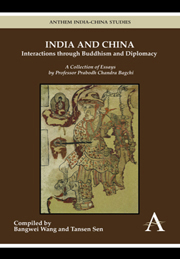 India and China: Interactions through Buddhism and Diplomacy
India and China: Interactions through Buddhism and Diplomacy from Part One
Published online by Cambridge University Press: 05 March 2012
The identification of Ki-pin, a country mentioned in the Chinese records of the Han period, has been a matter of controversy for many years. Prof. Sylvain Lévi was the first to suggest the identification of Ki-pin with Kashmir and to point out that there was no confusion in the Chinese records about the identity till 581 A.D. But since the T'ang period when a new transcription of the name of Kashmir as Kia-she-mi-lo came in use, the Chinese authors lost sight of the old identity and began to consider Ki-pin as another name of Kapiśa. Prof. Chavannes with the help of other Chinese records endorsed the view of Prof. Lévi. Since then the identification was accepted as conclusive but scholars not acquainted with the Chinese records reopened the discussion and summarily rejected the identification. Some of them have identified it with Kapiśa and others more vaguely with Kapiśa-Kāśmīra without any qualification. As the identification of Ki-pin is closely connected with the problem of the first Śaka invasion of India, the identification has been mainly actuated by their views on the Śaka invasion. The first country in India to be occupied by the Śaka invaders was Ki-pin and as most of the scholars believe that the Śakas came by the North-Western route through Afghanistan they are constrained to identify Ki-pin of the earlier period with Kapiśa or Kafiristan against the positive evidence of early records against it.
To save this book to your Kindle, first ensure [email protected] is added to your Approved Personal Document E-mail List under your Personal Document Settings on the Manage Your Content and Devices page of your Amazon account. Then enter the ‘name’ part of your Kindle email address below. Find out more about saving to your Kindle.
Note you can select to save to either the @free.kindle.com or @kindle.com variations. ‘@free.kindle.com’ emails are free but can only be saved to your device when it is connected to wi-fi. ‘@kindle.com’ emails can be delivered even when you are not connected to wi-fi, but note that service fees apply.
Find out more about the Kindle Personal Document Service.
To save content items to your account, please confirm that you agree to abide by our usage policies. If this is the first time you use this feature, you will be asked to authorise Cambridge Core to connect with your account. Find out more about saving content to Dropbox.
To save content items to your account, please confirm that you agree to abide by our usage policies. If this is the first time you use this feature, you will be asked to authorise Cambridge Core to connect with your account. Find out more about saving content to Google Drive.